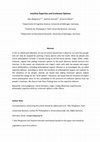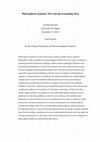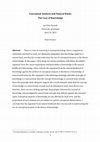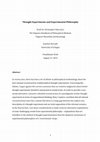Papers by Joachim Horvath
Previous research by Kneer and Bourgeois-Gironde (2017) suggests that legal experts are susceptib... more Previous research by Kneer and Bourgeois-Gironde (2017) suggests that legal experts are susceptible to the “severity effect” – they ascribe a higher level of intentionality for actions if they lead to very bad side-effects than when they have somewhat bad side-effects. These results are potentially problematic for the legal system because ascriptions of intentionality in the law explicitly depend on the evaluation of mental states of the agent (mens rea), not on the badness of the outcomes she caused. In this paper, we provide and test an alternative explanation of the “severity effect” that has no troubling implications for the law. We suggest that it may be a subtype of a more general “side-effect effect” (Knobe, 2003), which is compatible with certain legal criteria of ascribing intentionality.
Australasian Journal of Philosophy

Synthese
In this paper, we propose a general constraint on theories of knowledge that we call 'normalism'.... more In this paper, we propose a general constraint on theories of knowledge that we call 'normalism'. Normalism is a view about the epistemic threshold that separates knowledge from mere true belief; its basic claim is that one knows only if one has at least a normal amount of epistemic support for one's belief. We argue that something like normalism is required to do full justice to the normative role of knowledge in many key everyday practices, such as assertion, inquiry, and testimony. The view of normality we employ to flesh out this claim is inspired by experimental work on the folk notion of normality, which suggests that folk judgments of what is 'normal' are based upon both statistical averages as well as normative ideals within the relevant target domain. Adopting this notion of normality to set the threshold for knowledge results in a view upon which knowledge is routinely available on an everyday basis without being a merely trivial achievement. We explore several interesting consequences of this view, including the implication that the threshold for knowing may change as, e.g., the ease of availability of information in an epistemic community changes over time. The result is a 'shifty' view of knowledge which nonetheless retains more stability than standard contextualist or pragmatic encroachment approaches. Keywords Knowledge • Conceptual engineering • Epistemology • Normality 1 Introduction Most contemporary epistemologists agree that we know lots of things: we know our own names, we know where we live and go to work, we know that grass is green, that snow is white, and that tomatoes are red. Most of the things we know are quite mundane everyday propositions, as in the examples just given. Most would agree, then, that knowledge isn't a spectacular kind of intellectual achievement, but rather an B Jennifer Nado

Mind
The traditional epistemological approach towards judgments like BACHELORS ARE UNMARRIED or ALL KN... more The traditional epistemological approach towards judgments like BACHELORS ARE UNMARRIED or ALL KNOWLEDGE IS TRUE is that they are justified or known on the basis of understanding alone. In this paper, I develop an understanding-based account which takes understanding to be a sufficient source of epistemic justification for the relevant judgments. Understanding-based accounts face the problem of the rational revisability of almost all human judgments. Williamson has recently developed a reinforced version of this problem: the challenge from expert revisability. This is the problem that even the best candidate judgments for understanding-based justification can be rationally rejected by the relevant experts, who may not even have any disposition or inclination to accept these judgments. (Consider, for instance, Graham Priest, a leading logician who rejects the law of non-contradiction.) However, I argue that expert revisability is fully compatible with the proposed understanding-based...

Synthese, 2019
This paper provides new tools for philosophical argument analysis and fresh empirical foundations... more This paper provides new tools for philosophical argument analysis and fresh empirical foundations for ‘critical’ ordinary language philosophy. Language comprehension routinely involves stereotypical inferences with contextual defeaters. J.L. Austin’s 'Sense and Sensibilia' first mooted the idea that contextually inappropriate stereotypical inferences from verbal case-descriptions drive some philosophical paradoxes; these engender philosophical problems that can be resolved by exposing the underlying fallacies. We build on psycholinguistic research on salience effects to explain when and why even perfectly competent speakers cannot help making stereotypical inferences which are contextually inappropriate. We analyse a classical paradox about perception (‘argument from illusion’), suggest it relies on contextually inappropriate stereotypical inferences from appearance-verbs, and show that the conditions we identified as leading to contextually inappropriate stereotypical inferences are met in formulations of the paradox. Three experiments use a forced-choice plausibility-ranking task to document the predicted inappropriate inferences, in English, German, and Japanese. The cross-linguistic study allows us to assess the wider relevance of the proposed analysis. Our findings open up new perspectives for ‘evidential’ experimental philosophy.

In the so-called push dilemma, an out-of-control speed-train is about to run over five people and... more In the so-called push dilemma, an out-of-control speed-train is about to run over five people and can only be stopped by pushing a heavy person onto the tracks. Most lay people and moral philosophers consider it morally wrong to kill the heavy person. Unger (1992, 1996), however, argued that adding irrelevant options to the push dilemma would overturn this intuition. In this paper, we empirically test Unger's claim with both lay people and expert moral philosophers. Including philosophical experts allowed us to investigate the so-called expertise defense, according to which the intuitions of philosophical experts are superior to the intuitions of lay people. Overall, we found that adding irrelevant options indeed increased the ratings for the " push option ". Moreover, we found that the intuitions of expert moral philosophers were no less susceptible to the presence of irrelevant options than lay people's intuitions. We discuss how these findings bear on the expertise defense.

Philosophical analysis was the central preoccupation of 20th-century analytic philosophy. In the ... more Philosophical analysis was the central preoccupation of 20th-century analytic philosophy. In the contemporary methodological debate, however, it faces a number of pressing external and internal challenges. While external challenges, like those from experimental philosophy or semantic externalism, have been extensively discussed, internal challenges to philosophical analysis have received much less attention. One especially vexing internal challenge is that the success conditions of philosophical analysis are deeply unclear. According to the standard textbook view, a philosophical analysis aims at a strict biconditional that captures the necessary and sufficient conditions for membership in the relevant category. The textbook view arguably identifies a necessary condition on successful philosophical analyses, but understood as a sufficient condition it is untenable, as I will argue in this paper. To this end, I first uncover eight conditions of adequacy on successful philosophical analyses, some of which have rarely been spelled out in detail. As we shall see, even sophisticated alternatives to the textbook view fail to accommodate some of these conditions. I then propose the concept grounding view as a more promising account of philosophical analysis. According to this view, successful philosophical analyses require necessary biconditionals that are constrained by grounding relations among the concepts involved. Apart from providing a satisfactory account of philosophical analysis in its own right, the concept grounding view is also able to meet the challenge that the success conditions of philosophical analysis are problematically unclear.

Experimental restrictionists have challenged philosophers' reliance on intuitions about thought e... more Experimental restrictionists have challenged philosophers' reliance on intuitions about thought experiment cases based on experimental findings. According to the expertise defense, only the intuitions of philosophical experts count—yet the bulk of experimental philosophy consists in studies with lay people. In this paper, we argue that direct (experimental) strategies for assessing the expertise defense are preferable to indirect (inductive) strategies. A direct argument in support of the expertise defense would have to show: first, that there is a significant difference between expert and lay intuitions; second, that expert intuitions are superior to lay intuitions; and third, that expert intuitions accord with the relevant philosophical consensus. At present, there is only little experimental evidence that bears on these issues. To advance the debate, we conducted two new experiments on intuitions about knowledge with experts and lay people. Our results suggest that the intuitions of epistemological experts are superior in some respects, but they also pose an unexpected challenge to the expertise defense. Most strikingly, we found that even epistemological experts tend to ascribe knowledge in fake-barn-style cases. This suggests that philosophy, as a discipline, might fail to adequately map the intuitions of its expert practitioners onto a disciplinary consensus.

There is a line of reasoning in metaepistemology that is congenial to naturalism and hard to resi... more There is a line of reasoning in metaepistemology that is congenial to naturalism and hard to resist, yet ultimately misguided: that knowledge might be a natural kind, and that this would undermine the use of conceptual analysis in the theory of knowledge. In this paper, I first bring out various problems with Hilary Kornblith’s argument from the causal-explanatory indispensability of knowledge to the natural kindhood of knowledge. I then criticize the argument from the natural kindhood of knowledge against the method of conceptual analysis in the theory of knowledge. A natural motivation for this argument is the following seemingly plausible principle: if knowledge is a natural kind, then the concept of knowledge is a natural kind concept. Since this principle lacks adequate support, the crucial semantic claim that the concept of knowledge is a natural kind concept must be defended in some more direct way. However, there are two striking epistemic disanalogies between the concept of knowledge and paradigmatic natural kind concepts that militate against this semantic claim. Conceptual analyses of knowledge are not affected by total error, and the proponents of such analyses are not subject to a priori conceptual obliviousness. I conclude that the argument from natural kindhood does not succeed in undermining the use of conceptual analysis in the theory of knowledge.

In recent years, there has been a lot of debate in philosophical methodology about the best ratio... more In recent years, there has been a lot of debate in philosophical methodology about the best rational reconstruction of philosophical thought experiments. Concerning this debate, I argue against the current consensus that our intuitive judgments about Gettier thought experiments should be interpreted in modal terms. In order to provide a non-modal alternative, I present a detailed reconstruction of a paradigmatic Gettier thought experiment in terms of suppositional thinking. Next, I explore a problem that all rational reconstructions must face, namely that there is a large gap between the explicit case description of a thought experiment and our total supposition of the relevant scenario. In the final section, I use these considerations to make room for alternative explanations of some challenging results from experimental philosophy – explanations that are friendlier to the method of thought experimentation than the skeptical conclusions of experimental philosophers of a ‘restrictionist’ stripe.

In recent work, E. J. Lowe presents an essence-based account of our knowledge of metaphysical mod... more In recent work, E. J. Lowe presents an essence-based account of our knowledge of metaphysical modality that he claims to be superior to its main competitors. I argue that knowledge of essences alone, without knowledge of a suitable bridge principle, is insufficient for knowing that something is metaphysically necessary or metaphysically possible. Yet given Lowe’s other theoretical commitments, he cannot account for our knowledge of the needed bridge principle, and so his essence-based modal epistemology remains incomplete. In addition to that, Lowe’s account implies a psychologically unrealistic reconstruction of how we ordinarily acquire knowledge of metaphysical modalities. The discussion of Lowe’s suggestive essence-based account is also intended as a case study that illustrates a more general problem in the epistemology of modality: the great difficulty of explaining our modal knowledge in terms of a single overtly non-modal kind of knowledge. The failure of Lowe’s account suggests that such a sweeping reductive explanation of our modal knowledge might simply not be available. This should be good news for those philosophers who champion less reductive or more pluralistic accounts of our modal knowledge.
Descriptions of Gettier cases can be interpreted in ways that are incompatible with the standard ... more Descriptions of Gettier cases can be interpreted in ways that are incompatible with the standard judgment that they are cases of justified true belief without knowledge. Timothy Williamson claims that this problem cannot be avoided by adding further stipulations to the case descriptions. To the contrary, we argue that there is a fairly simple way to amend the Ford case, a standard description of a Gettier case, in such a manner that all deviant interpretations are ruled out. This removes one major objection to interpreting our judgments about Gettier cases as strict conditionals.
Philosophical Psychology, 2010
In this paper, I am going to offer a reconstruction of a challenge to intuition-based armchair ph... more In this paper, I am going to offer a reconstruction of a challenge to intuition-based armchair philosophy that has been put forward by experimental philosophers of a restrictionist stripe, which I will call the ‘master argument’. I will then discuss a number of popular objections to this argument and explain why they either fail to cast doubt on its first, empirical premise or do not go deep enough to make for a lasting rebuttal. Next, I will consider two more promising objections, the grounding objection and the expertise objection, which aim at the second, epistemic premise of the argument. Against this background, I will then suggest what I call ‘conservative restrictionism’ as the most reasonable default reaction to the experimentalist challenge, which is a combination of the two views of local restrictionism and methodological conservativism.
Philosophical Psychology, 2010
In this brief introduction, we would first like to explain how these two special issues of Philos... more In this brief introduction, we would first like to explain how these two special issues of Philosophical Psychology (Nos. 23.3 & 23.4) actually came about. In addition, we will provide an outline of their overall structure and shortly summarize the featured papers.
The Swamping Problem is one of the standard objections to reliabilism. If one assumes, as reliabi... more The Swamping Problem is one of the standard objections to reliabilism. If one assumes, as reliabilism does, that truth is the only non-instrumental epistemic value, then the worry is that the additional value of knowledge over true belief cannot be adequately explained, for reliability only has instrumental value relative to the non-instrumental value of truth. Goldman and Olsson reply to this objection that reliabilist knowledge raises the objective probability of future true beliefs and is thus more valuable than mere true belief. I argue against their proposed solution to the Swamping Problem that the conditional probability of future true beliefs given knowledge is not clearly higher than given mere true belief.

Ratio, 2009
Kant famously argued that, from experience, we can only learn how something actually is, but not ... more Kant famously argued that, from experience, we can only learn how something actually is, but not that it must be so. In this paper, I defend an improved version of Kant's argument for the existence of a priori knowledge, the Modal Argument, against recent objections by Casullo and Kitcher. For the sake of the argument, I concede Casullo's claim that we may know certain counterfactuals in an empirical way and thereby gain epistemic access to some nearby, nomologically possible worlds. But I maintain that our beliefs about metaphysical necessities still cannot be justified empirically. Furthermore, I reject Casullo's deflationary thesis about the significance of such justification. Kitcher's most troublesome objection is that we can gain any modal justification whatsoever through testimony, i.e. in an experiential way. This can be countered by distinguishing between productive sources of justification, like perception, and merely reproductive sources, like testimony. Thus, some productive a priori source will always be needed somewhere.1
Ratio, 2008
According to the so-called metaphysical conception of analyticity, analytic truths are true in vi... more According to the so-called metaphysical conception of analyticity, analytic truths are true in virtue of meaning (or content) alone and independently of (extralinguistic) facts. Quine and Boghossian have tried to present a conclusive argument against the metaphysical conception of analyticity. In effect, they tried to show that the metaphysical conception inevitably leads into a highly implausible view about the truthmakers of analytic truths. We would like to show that their argument fails, since it relies on an ambiguity of the notion of ‘independence of (extralinguistic) facts’. If one distinguishes between variation independence and existence independence, the unwelcome view about the truthmakers of analytic truths no longer follows. Thus, there is at best a challenge, but no conclusive argument. The door to the metaphysical conception of analyticity is still open.1





Uploads
Papers by Joachim Horvath